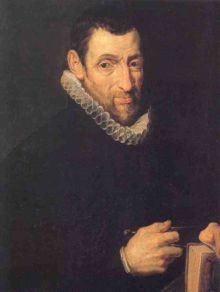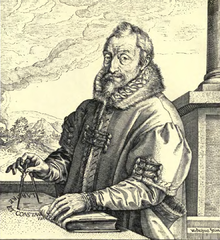- Christophe Plantin
-
Christophe Plantin 
Portrait of Plantin by RubensBorn c. 1520
FranceDied 1 July 1589
Antwerp, BelgiumResting place Antwerp, Belgium Years active 1548–1589 Known for Plantin Press Net worth 135,718 florins Christophe Plantin (in Dutch Christoffel Plantijn) (c. 1520 – 1 July 1589) was an influential Renaissance humanist and book printer and publisher.
Contents
Life
Plantin was born in France, probably in Touraine or Saint-Avertin, near the city of Tours. He learned bookbinding and bookselling in Caen. He married someone from Antwerp, and settled there in 1549 as a bookbinder.
In 1555, he opened his own printing establishment and soon became a leader of that trade. The first book he is known to have printed was La Institutione di una fanciulla nata nobilmente, by J. M. Bruto, with a French translation. This was soon followed by many other works in French and Latin, which in point of execution rivalled the best printing of his time. The art of engraving then flourished in the Netherlands, and Dutch engravers illustrated many of his editions. Around 1555, an arm wound appears to have led him to apply himself to typography.
In 1562, while Plantin was absent in Paris, his workmen printed a heretical pamphlet, which resulted in his goods being seized and sold. It seems, however, that he eventually recovered much of the value that was taken from him. In 1563, he associated himself with some friends to carry on his business on a larger scale. Among these friends were two grand-nephews of Daniel Bomberg, who furnished him with the fine Hebrew typefaces of that renowned Venetian printer.
In November 1576, the Spaniards plundered and partly burned Antwerp, and Plantin had to pay an exorbitant ransom. He established a branch of his firm in Paris. In 1583, the states of Holland sought a typographer for the newly erected university at Leiden. Plantin moved there after leaving his much reduced business in Antwerp to his sons-in-law John Moerentorf (Jan Moretus) and Francis van Ravelinghen (Raphelengius). Plantin left his Leiden office to Raphelengius and returned to Antwerp after it became more settled, subsequent to its conquest by the prince of Parma in 1585. Plantin laboured in Antwerp until his death.
Printing work
His most important work is the Biblia Regia, published between 1568 and 1572. His editions of the Bible in Hebrew, Latin and Dutch, his Corpus juris, Latin and Greek classics, and many other works produced at this period are renowned for their beautiful execution and accuracy. He also planned a much greater enterprise—the publication of a Biblia polyglotta, which would fix the original text of Old and New Testaments on a scientific basis. In spite of clerical opposition, he was supported by King Philip II of Spain, who sent him the learned Benito Arias Montano to lead the editorship. With Montano's zealous help, the work was finished in five years (1569-1573, 8 vols, folio). This work earned Plantin little profit, but resulted in Philip's granting him the privilege of printing all Roman Catholic liturgical books (missals, breviaries, etc.) for the states ruled by Philip, and the office of prototypo-graphus regius.
Besides the polyglot Bible, Plantin published many other works of note, such as editions of St. Augustine and St. Jerome, the botanical works of Dodonaeus, Clusius and Lobelius, and the description of the Netherlands by Guicciardini. In 1575, his printing firm reckoned more than 20 presses and 73 workmen, in addition to a similar number that worked for him out of their homes.
Though outwardly a faithful son of the Catholic church, he was a lifelong supporter of a mystical sect of heretics. It is now proved that many of their books published without naming the printer came from his presses.
Legacy
After Plantin's death, his firm was taken over by his son-in-law, Jan Moretus. Today, the building that housed the firm is called the Plantin-Moretus Museum. Moretus and his descendants continued to print many works of note in officina Plantiniana, but the firm began to decline in the second half of the 17th century. It remained, however, in the possession of the Moretus family, which left everything in the office untouched, and when the city of Antwerp acquired (for 1.2 million francs) the old buildings with all their contents, the authorities created, with little trouble, the Musee Plantin, which opened on 19 August 1877.
In 1968, the Christophe Plantin Prize was created in his memory, given to a Belgian civilian who resides abroad, who has made significant contributions to cultural, artistic or scientific activities.
See also
- Plantin Press
- Dirk Martens
- Plantin (typeface)
Bibliography
- De Backer, A., and Ruelens, C., Annales plantiniennes depuis la fondation de l'imprimerie plantinienne (Brussels, 1866).
- Clair, Colin, Christopher Plantin (London, Cassell, 1960)
- Degeorge, Léon, La Maison Plantin à Anvers, 2nd ed. (Brussels, 1878).
- Rooses, Max, Christophe Plantin, imprimeur anversois (Antwerp, 1882).
- Voet, L., and Voet-Grisolle, J., The Plantin Press (1555-1589) (6 vols., Amsterdam 1980-1983).
 This article incorporates text from a publication now in the public domain: Chisholm, Hugh, ed (1911). Encyclopædia Britannica (11th ed.). Cambridge University Press.
This article incorporates text from a publication now in the public domain: Chisholm, Hugh, ed (1911). Encyclopædia Britannica (11th ed.). Cambridge University Press.- Voet, Leon, The Golden Compasses : a history and evaluation of the printing and publishing activities of the Officina Plantiniana at Antwerp, in two volumes. Vol. 1, Christophe Plantin and the Moretuses. (Amsterdam and London, 1969).
External links
 This article incorporates text from a publication now in the public domain: Chisholm, Hugh, ed (1911). "Christophe Plantin". Encyclopædia Britannica (11th ed.). Cambridge University Press. http://www.1911encyclopedia.org/Christophe_Plantin.
This article incorporates text from a publication now in the public domain: Chisholm, Hugh, ed (1911). "Christophe Plantin". Encyclopædia Britannica (11th ed.). Cambridge University Press. http://www.1911encyclopedia.org/Christophe_Plantin. "Christophe Plantin". Catholic Encyclopedia. New York: Robert Appleton Company. 1913.
"Christophe Plantin". Catholic Encyclopedia. New York: Robert Appleton Company. 1913.- (Dutch) Plantin Moretus Museum
- (English) Biography of Christophe Plantin.
- The Plantin-Moretus Museum.
- Bookbinding for Emperor Charles V by Plantijn. Treasure no.3 National Library of The Netherlands displayed via The European Library
Categories:- 1520s births
- 1589 deaths
- History of Antwerp
- Printers
- French Renaissance humanists
- Flemish people
- Belgian printers
- French printers
Wikimedia Foundation. 2010.

